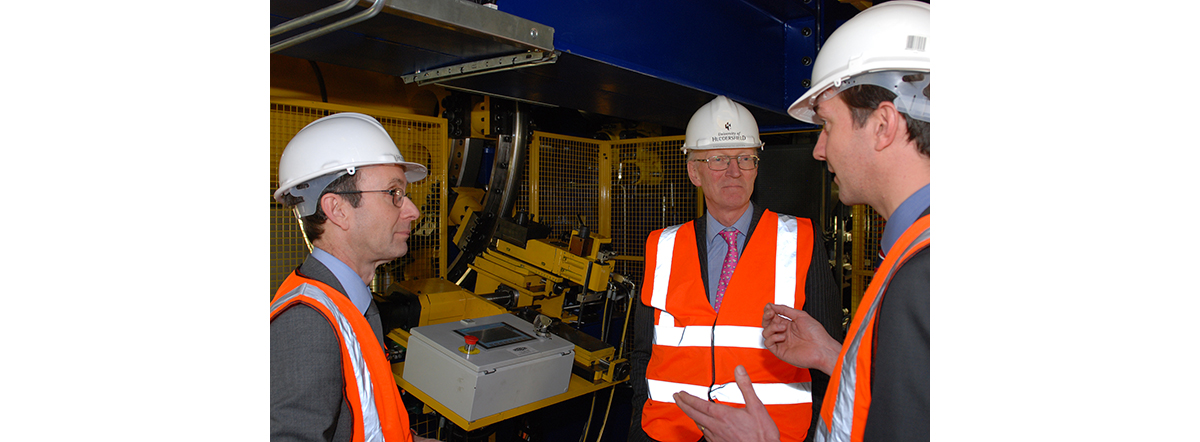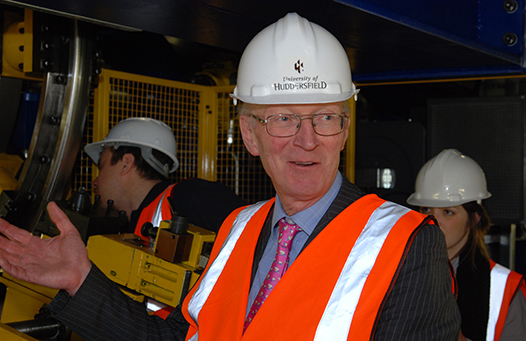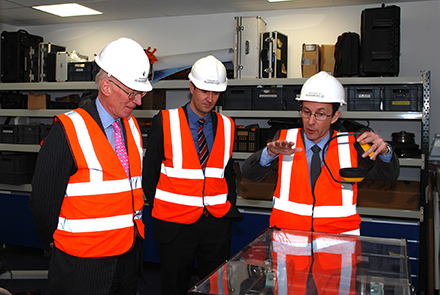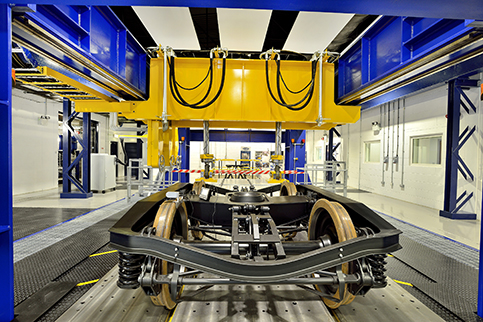Government minister visits IRR £5m test rig
 Lord Prior (centre) is pictured with the Institute's Professor Simon Iwnicki (left) and Dr Paul Allen
Lord Prior (centre) is pictured with the Institute's Professor Simon Iwnicki (left) and Dr Paul Allen
Fri, 31 Mar 2017 13:03:00 BST
Lord Prior, Parliamentary Under Secretary of State at the Department of Business, Energy and Industrial Strategy, was welcomed by the University’s Institute of Railway Research
 ON a fact-finding visit to the University of Huddersfield, a Government minister whose remit includes industrial strategy heard how its Institute of Railway Research (IRR) can help attract major overseas investment in the UK rail manufacturing sector.
ON a fact-finding visit to the University of Huddersfield, a Government minister whose remit includes industrial strategy heard how its Institute of Railway Research (IRR) can help attract major overseas investment in the UK rail manufacturing sector.
He was shown the work of the Centre for Innovation in Rail – based within the Institute – and facilities that include a £5 million test rig. Also, the IRR’s director, Professor Simon Iwnicki, told Lord Prior of Brampton about a campaign to attract talented young engineering students to the rail industry.
Lord Prior (pictured left) – formerly a Conservative MP – is Parliamentary Under Secretary of State at the Department of Business, Energy and Industrial Strategy. He came to the University of Huddersfield to visit the regional hub of the National Physical Laboratory, based in the 3M Buckley Innovation Centre. He then moved on to the Institute of Railway Research.
 Joining Professor Iwnicki to describe its work and facilities were the IRR’s Assistant Director, Dr Paul Allen, who leads the Centre for Innovation in Rail, and Test Applications Engineer Barnaby Bryce. Lord Prior was told how the IRR has a special focus on the interface between rail and wheel, and how the new rig – the rail equivalent of a rolling road – could be adapted to test different aspects of this. Its capabilities included the capacity to exert 50 tons of downward pressure on wheelsets and rails.
Joining Professor Iwnicki to describe its work and facilities were the IRR’s Assistant Director, Dr Paul Allen, who leads the Centre for Innovation in Rail, and Test Applications Engineer Barnaby Bryce. Lord Prior was told how the IRR has a special focus on the interface between rail and wheel, and how the new rig – the rail equivalent of a rolling road – could be adapted to test different aspects of this. Its capabilities included the capacity to exert 50 tons of downward pressure on wheelsets and rails.
His Lordship saw a Y25 freight bogie – an example of the most widely-used type in Europe – that has been acquired to aid testing on the rig, plus a tube train bogie that has been donated to help with special projects in conjunction with London Underground.
Lord Prior’s career has included a stint as a senior executive with British Steel, and he took a special interest in the metals used for making modern rails, asking whether they had remained the same or any major developments were likely. He was told that incremental improvements were being made, including new steel micro-structures, but that steel still had enormous potential as well as being cost-effective.
 Professor Iwnicki introduced Lord Prior to Masters engineering students taking part in the development and construction of a miniature locomotive for the Railway Challenge contest run by the Institution of Mechanical Engineers, aiming to attract new talent to the sector. The students showed the Minister the inner workings of the loco – named Huddrail – including its complex electrics.
Professor Iwnicki introduced Lord Prior to Masters engineering students taking part in the development and construction of a miniature locomotive for the Railway Challenge contest run by the Institution of Mechanical Engineers, aiming to attract new talent to the sector. The students showed the Minister the inner workings of the loco – named Huddrail – including its complex electrics.
Lord Prior asked if there was still romance attached to the railways. Professor Iwnicki said that his objective to move beyond that, in order to attract fresh talent: “Developments such as HS2 and Crossrail show that rail is not romantic any more – it’s the future”.
The Minister was told that the world-class research carried by large institutes such as the IRR – which has a staff of 36 – would encourage multi-national giants, such as Hitachi, to invest in the UK rail manufacturing sector.
Professor Iwnicki also told Lord Prior that half of the work of the IRR was carried out on behalf of industry, with problems often solved within a short time frame. The Institute also has a major partnership with RSSB, the Rail Standards and Safety Board, to carry out troubleshooting research.







